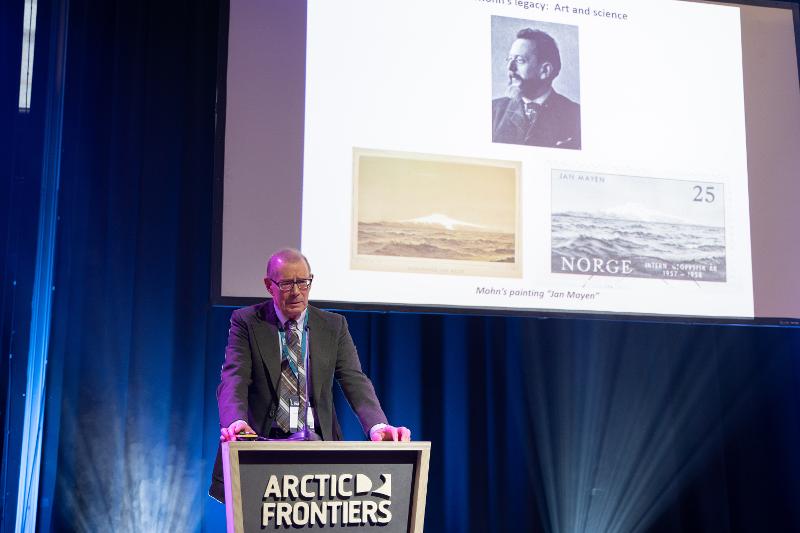
Prisvinner 2022
Professor John E. Walsh

Den vitenskapelige komité skrev dette i sin anbefaling:
We highly recommend Dr. John E. Walsh as the top candidate for the Mohn Prize for his continuous leading role in generating our common understanding of how sea ice dynamics link intimately with ongoing changes, including extreme events, across the Arctic system. He pioneered the linking of observation-based, multi-dimensional (coupled) climate–sea ice– atmospheric circulation models with global climate models to reveal the Arctic’s critical role in the global system. This knowledge has been disseminated to national and international policy-making and general audiences via influential scholarly reports, multi-disciplinary assessments, and public presentations.
***
The (individual) nominee: Dr. John E. Walsh
Dr. Walsh is distinguished Chief Scientist and President’s Professor of Global Change at the Institute for Arctic Research (IARC), University of Alaska Fairbanks. He also serves as Director of NOAA’s Cooperative Institute for Alaska Research, and of the University’s Center for Global Change. He continues to be one of the most active Arctic scholars in the fields of Arctic environmental change, seasonal to decadal variability of sea ice, predictability of climate change at high latitudes, and changes in Arctic weather in the context of rapid change. He is widely recognized for his international scientific leadership in developing a broad scholarly vision of how recent shifts in temperature, snow, sea ice, permafrost, atmospheric circulation, and terrestrial ecosystems all link together, combining evidence from observations across the Arctic with complex Earth system modelling and predictions.
Excellence in research/development of ground-breaking new knowledge
The Committee unanimously views Dr. Walsh as an influential generator of new, groundbreaking knowledge about the changing Arctic climate system that is simultaneously creative, practical and of high public value beyond the scientific community. He is one of the most authoritative scholars in the field of modern Arctic change. His many outstanding contributions establish (1) intimate connections between sea ice dynamics and the Arctic ocean/atmosphere/land system; (2) historical and recent fluctuations of sea ice cover that impact navigational routes and coastal regions; (3) Arctic processes causing increased weather volatility in mid-latitude regions; (4) downscaled coupled global models producing high-confidence scenarios for regional change; (5) extreme weather events of unusual heat and cold waves, storms, floods, droughts and severe winter weather of increasing societal impact; and much more. Dr. Walsh's impressive scholarly record of over 300 peer-reviewed publications is regularly punctuated by insightful sole- and first-authored papers that educate broadly and highlight fruitful research directions. He works across scientific disciplines, publishing with a large number of coauthors from many countries. His outstanding service to Arctic science has been broadly recognized, including as recipient of the 2016 International Arctic Science Committee (IASC) Medal, the Usibelli Distinguished Researcher Award from the University of Alaska, Fellow of the American Meteorological Society, and Fellow of the American Association for the Advancement of Science.
Recognized as a leader in his field
Dr. Walsh is acclaimed for his “exceptional and sustained contributions to the understanding of the Arctic, …from climate and weather extremes to hydrology, sea ice, variability and the human dimensions of climate change impacts” (from the citation for his 2016 IASC Medal). His exceptional scientific leadership and international teamwork have promoted the understanding of how changes across the polar regions are linked together, using evidence from observations and from the predictions of Earth system modeling. He was lead author for the cryosphere chapter of the Arctic Climate Impact Assessment (ACIA, 2005), the Polar Regions chapter of the IPCC’s Fourth Assessment Report (APR-4, 2007), the Arctic climate and modeling chapters of the Snow, Water, Ice and Permafrost in the Arctic report (SWIPA, 2011) of the Arctic Monitoring and Assessment Program (AMAP) of the Arctic Council, and the chapter "Our Changing Climate" and key appendices in the 3rd US National Climate Assessment report (2014).
Highlight issues that are of particular relevance to the future development of the Arctic (and put these issues on the national/international agenda)
Dr. Walsh’s research and service epitomize how future development of the Arctic depends upon our ability to understand the connections between all components of the Arctic system, from the ocean and atmosphere to ice, land and people of the North. In proactively seeking to bring into the realm of policy-making and public knowledge the best of this type of coupled-system science, in which he excels as both leader and team member, he stands as a towering figure in the studies of modern Arctic change. His work is at the cutting edge in documenting levels and trends, and pathways and processes in various fields, with multiple effects on marine and terrestrial ecosystems and people. He actively promotes the role of science in developing policies to reduce associated threats for consideration by governments, and in producing sound science-based, policy-relevant assessments and public outreach products that inform decision. Dr. Walsh has been a strong spokesperson for the pervasive nature of Arctic warming and the need for in-depth records of change in all components of the global system. His leadership was critical to our success to monitor and assess the status of the Arctic region with respect to global warming, cascading environmental change, air pollution, and related issues, and to bring possible mitigating actions to the attention of decision-makers. His work illuminates the role of science in addressing environmental changes that significantly impact resources, living conditions for the people and sustainability of Arctic regions. Dr. Walsh's research underscores that scientific knowledge emerging from a sharp regional focus and careful downscaling of global models is critical to developing adaptation strategies for Northern communities affected by climate change, as mitigation strategies cannot be applied uniformly across the diverse Arctic regions.